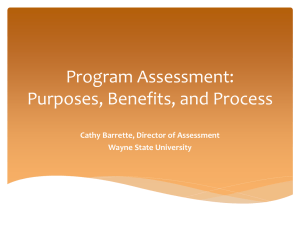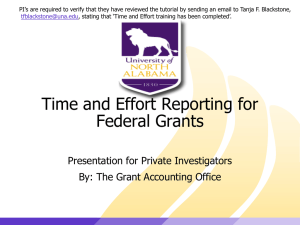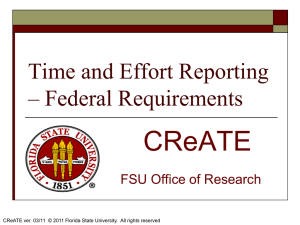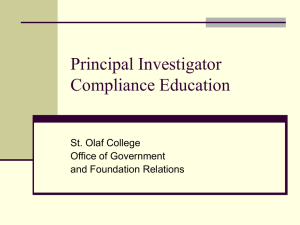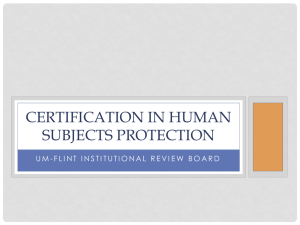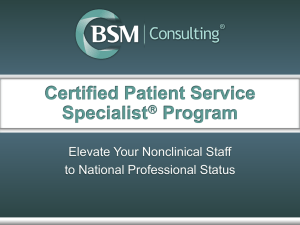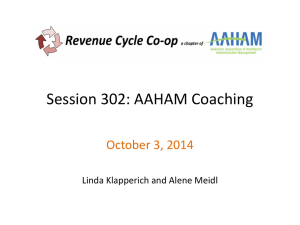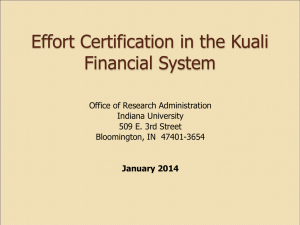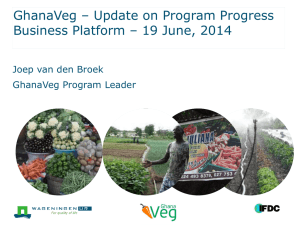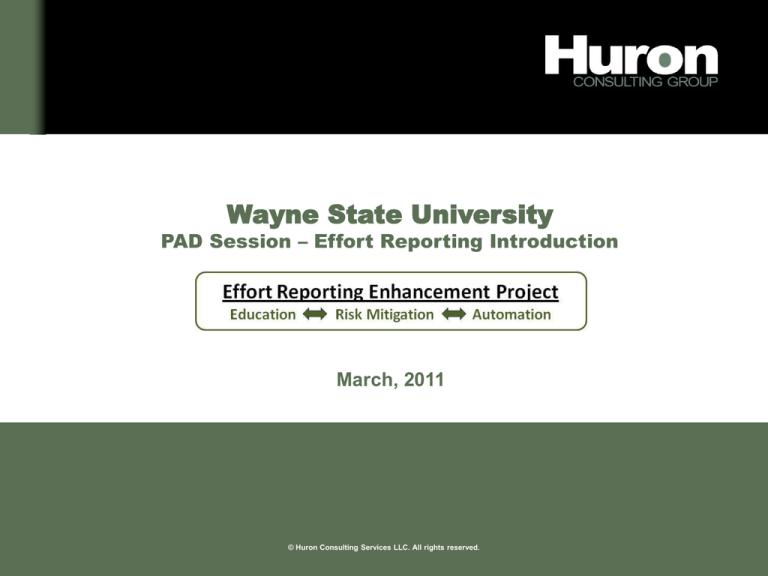
Wayne State University
PAD Session – Effort Reporting Introduction
2009
March, 2011
1
We listen. We partner. We focus. We deliver.
© Huron Consulting Services LLC. All rights reserved.
Agenda
• What is Effort Reporting? Why do we need to do it?
• Project background
• Summary of changes in how we do Effort Reporting
• Fundamental concepts and requirements
• Support and additional information
• System “Demo” and Training
2
We listen. We partner. We focus. We deliver.
What is Effort Reporting? Why do we
need to do it?
• Effort reporting is required by the federal government (OMB Circular A-21,
Section J-10), since Wayne State University receives federal funds to be
used for sponsored research.
• It applies only those faculty and staff who are involved in sponsored/
externally funded research ( i.e. those who charge or cost share part of their
salary to sponsors, and/or who have effort commitments to sponsored
programs).
• It serves as an after-the-fact confirmation that the assignment of time and
associated salary and fringe benefit costs to individual sponsored projects is
fair, consistent, and timely.
• Effort reporting is not new to WSU. We have been doing it for several years
via paper-based “Payroll Certification” forms. We are now moving to an
online system (a module contained within Banner) that will provide greater
efficiency and better position WSU to meet its compliance requirements.
• The sole purpose and capability of the new system is effort reporting
compliance.
3
We listen. We partner. We focus. We deliver.
WSU Project Background
• WSU is focused on enhancing its compliance with federal
requirements related to effort reporting
• This has, and will continue to include cultural as well as
operational and technical changes
• Over the past year, WSU evaluated automated solutions
and is now in the process of kicking off a project to
implement the Effort Reporting module offered by Banner
• Huron is providing subject matter and project
management assistance for the project
4
We listen. We partner. We focus. We deliver.
Project Update
H i g h -L e v el T i m el in e
J uly
August
Septem ber
O ctober
N ovem ber
D ec embe r
Januar y
P lan and Man ag e th e P roject
Kic koff/Mobilization
O ngoing M anagem ent
A n alyz e C u rren t Stat e
Policies and Proc edures
Educ ational Materials and D eliver y O ptions
C om mon Pr actic ie s and Lev els of U nderstanding
U se of T echno logy
D esig n an d D evelo p F ut u re St ate
v
v
Policies and Proc edures
Educ ational Materials and D eliver y O ptions
C om mon Pr actic ie s and Lev els of U nderstanding
D esign and C onfigure Ban ner E ffort M odule
S ystem In stallat io n , C o n fig u ratio n an d T estin g
In itial A pplic ation Installation and S etup
D etailed Application C onfiguraiton
Validate D ata and T est Banner Effort M odule F unctionality
D ep loy
D eliver C om munication & E ducation on Policy & P rocedur es
D eliver C om munication & E ducation on Ban ner E ffort M odule
D eploy Banner E ffort M odule and R elated Pr actic es
Milestones & Progress to Date
5
Project Kickoff July 1
Completed Current State Assessment
System configuration and testing complete
Conducted “Effort 101” sessions
We listen. We partner. We focus. We deliver.
Produced draft “Effort Reporting
Procedures and Guidelines”
Continuing Effort Education
Finalizing plans for rollout/go-live
F ebrua ry
Summary of Key System & Process
Changes
• All electronic – no paper!
– “Effort” displayed as percentages (based on Banner payroll/labor distribution)
• Pre-Review
– Quality control function performed by departmental administrative staff
– Purpose is to identify effort reports that do not reasonably reflect the EFFORT during
the period of performance
– Pre-review is mandatory. Certification can’t take place until pre review is complete
• Grad Student Certification
– Will be performed by PI’s, not by grad students
– Grad students will not receive email notifications, nor have the ability to certify in the
system
• Research Assistant Certification
– It is intended that research assistants perform their own certification
– PI’s will be assigned as “Alternate Certifiers” for research assistants, and will have
the ability to certify for research assistants if needed
• Summer Certification
– For 9-month faculty, there will be a separate certification cycle for the summer period
6
We listen. We partner. We focus. We deliver.
The Context of Effort Reporting
Effort Reporting encompasses more than just certifying effort
7
Appointing
Faculty &
Staff
Preparing
the Proposal
Budget
• Employment
terms are
established.
• Effort is
proposed, a
commitment is
made to the
sponsor.
We listen. We partner. We focus. We deliver.
Charging
Salary
• Salary is charged
(or cost shared),
consistent with
activity.
Adjustments may
be made, shortly
after-the-fact.
Certifying
Effort
• Effort is attested
to, after activity
has occurred
(adjustments to
salary distribution
may be made if
effort < salary%).
Who Needs to Certify?
• All individuals paid from or with effort committed to a sponsored
project are required to complete an effort report , per federal
regulations
• Effort reports should be certified by:
– An employee, principal investigator or other responsible official with
first-hand knowledge of all of an employee’s effort, or
– An individual who used suitable means of verifying that the work was
performed.
8
We listen. We partner. We focus. We deliver.
Role of the Principal Investigator (PI)
• Sponsored awards are made to Wayne State University, with the Principal
Investigator serving as the “steward” of the research project and
accompanying funds received from the sponsor
• The University is legally responsible to the sponsor, but the PI is held
accountable for the proper fiscal management and conduct of the project. PI
responsibilities include:
– Scientific performance of the work related to the project
– Management of the project within funding limitations
– Assurance that the sponsor will be notified when significant conditions related to
the project change
– Responsibility for the day-to-day management of project finances may be
delegated to administrative or other staff, but accountability for compliance
with WSU policy and sponsor requirements ultimately rests with the PI.
9
We listen. We partner. We focus. We deliver.
What is Effort?
• Effort is the portion of time spent on a given professional activity and
expressed as a percentage of the total professional activity for which
an individual is employed by WSU.
• Important points:
– The government recognizes that it is a “reasonable estimate”
– Total effort must equal 100%
– Effort is not based on a standard (e.g., 40-hour) work week, instead based on
whatever was worked
– “100% Effort” considers all professional activities related to the individual’s WSU
appointment (teaching, research, service)
– Effort does not include outside activities:
• External consulting
• Special activities resulting in a one-time payment
• Temporary activities over and above normal responsibilities
• For clinical faculty, VA and UPG activities
10
We listen. We partner. We focus. We deliver.
A Perspective on “Effort”
“Effort” from Wayne State’s
perspective:
• Overall, the Banner payroll/labor
distribution does not reflect the hours
I spend, nor does it capture the
different types of effort I put forth for
WSU.
• All my effort, regardless of who is
paying for it or when it’s done is
important and should be recognized.
“Effort” from the government’s perspective:
• The federal government wants to know how
individuals working on federally-sponsored
programs are expending all of their effort
• In proposals, key personnel indicated their
estimated effort and requested the associated
salary, or made a cost-sharing commitment that the
institution would fund the salary
• While not perfect, payroll/labor distributions serve
as a reasonable starting point for effort certification
(it may be off in terms of both timing and source)
• Effort certification serves as an after-the-fact
confirmation that the individual/key personnel
expended the promised effort, and that they
worked at least as much as the percent of their
salary charged/cost-shared to the project
11
We listen. We partner. We focus. We deliver.
Certifying Effort or Payroll?
• Effort reports may pre-populate total percentages of payroll distributions to be
used as a starting point, since it is often assumed that payroll distribution is
monitored and revised based on effort expended
• However, these percentages may need to be revised during certification
based on actual expended effort
• This after-the-fact confirmation is necessary for compliant effort reporting
12
We listen. We partner. We focus. We deliver.
Reasonable Estimate & Suitable Means
• Sponsors recognize that the activities that constitute effort are
often difficult to separate. Effort certification must often rely on a
reasonable estimate of effort, and when estimating, a degree of
tolerance (up to 5%) is appropriate. Examples:
– It would be reasonable for a faculty member who was awarded and expended
40% effort on a grant to sign an effort report stating 39% payroll support for
that grant.
– It would not be reasonable for a faculty member who teaches two classes to
certify that she worked 95% on sponsored research.
• What are suitable means of verification?
⁻ The individual should have some documentation of how the time
was spent that is certified.
⁻ Documentation could be in the form of an email, calendar, project
reports, etc.
13
We listen. We partner. We focus. We deliver.
Committed Effort
• Committed effort is the amount of effort promised by the institution in the
proposal or the amended effort included in the award documentation.
• The total distribution of effort dedicated to all institutional activities for an
individual must not be greater than 100%, including cost sharing
commitments.
• 100%, or nearly 100% research effort, is not realistically possible for
individuals with significant non-research obligations to the institution
(e.g., teaching and service).
• If key personnel intend to reduce their effort on sponsored programs by
more than 25%, the institution needs to notify the sponsor and receive
approval.
• If the receipt of an award increases an investigator’s committed effort to
greater than 100%, the investigator must revise the level of effort
requested by communication with the sponsor, reduce effort on other
activities, or refuse the award.
14
We listen. We partner. We focus. We deliver.
Plans for System Rollout
Date
1/10
1 Prepare Production Environment
2 Training
3 Conduct Pre-Review/Admin. Training Wk of 2/7
4 Distribute Certifier Training Materials Wk of 2/21
5 Pre-Review Period
2/14
6 Initial Pre-review notification
2/28
7 First pre-review reminder
3/7
8 Second pre-review reminder
3/10
9 Third/final pre-review reminder
3/14
10 SPA Direct Follow Up
11 Certification Period
3/7
12 Initial Certification Notification
3/21
13 Certification reminder
4/4
14 Certifications Complete!
4/4
15 First certification late reminder
4/8
16 Second certification late reminder
January
1/17 1/24
1/31
2/7
February
2/14 2/21
2/28
March/April
3/14 3/21 3/28
3/7
• By the time you certify, you’re departmental administrative staff willl have already
reviewed your effort report(s). This is a required step in the work flow.
• Research faculty and staff who have effort reports eligible for certification will be notified
via a system-generated email on or about March 7.
• Certification due date is April 4. System generated reminders and notices will be sent as
outlined in the above timeline.
15
We listen. We partner. We focus. We deliver.
4/4
Support and Additional Information
What if I have questions or problems?
• Your departmental business manager and other resources have been trained to help
you. They can answer questions about using the system and about the information
and percentages that appear on the effort reports.
• You can also contact Sponsored Programs Administration.
Patrick Maher
Marlene Erno
merno@wayne.edu
313.577.6594
patrick.maher@wayne.edu
313.577.6597
• For additional information on effort reporting (educational materials, operational
guidelines, etc.) please see the SPA web site:
http://www.spa.wayne.edu/post/effort_reporting.php
• Education and Guidance on Effort Reporting
– Draft Effort Guidelines – Provides guidance on how manage effort reporting at WSU
– “Effort 101” – Covers key effort reporting definitions and concepts
– Effort Reporting FAQ document
• Navigation and use of the new effort reporting system. Guides have been
developed specifically for:
– Research faculty and staff
– Departmental administrative support staff
16
Questions? Comments??
17
We listen. We partner. We focus. We deliver.

